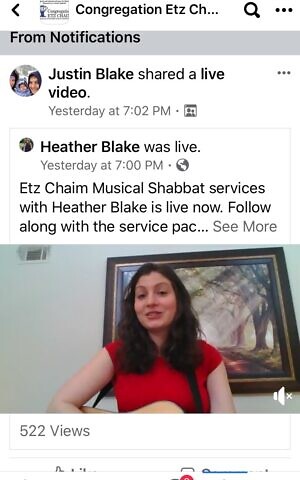Zoombombing: New Frontier of Anti-Semitism?
Zoombombing, is a growing concern to those who fight crime and hate, including the FBI and the Anti-Defamation League.

While The Temple was hosting classes on Zoom, as it does every day lately, a few people dressed in black started popping up on screens with anti-Semitic backgrounds in two of the classes. “They start shouting anti-Semitic slogans about Jews, use the ‘n’ word, and in both cases shouting, ‘allahu akbar’ (God is most great, in Arabic),” said Senior Rabbi Peter Berg.
“In both cases, we removed the individuals from the call and have taken necessary protocols to prevent these individuals from rejoining our Zoom classes.”

A musical Shabbat service of Congregation Etz Chaim on Zoom and Facebook Live was also disrupted about 15 minutes into the program by someone screensharing a meme with the “f” word and drawing a phallic symbol. This was followed by someone showing explicit pornography, and later, after screen sharing was disabled but before the sound muted, a recording with derogatory speech including the “n” word. Heather Blake, Etz Chaim engagement director who led the program from her home, directed about 30 in attendance to only use Facebook Live for the remainder of the pre-Shabbat service. Visibly flustered, she apologized several times during the Facebook program about the late start and shortened service resulting from the disruption. “I wish I had acted faster and closed the meeting as soon as the meme was up, but it was hard to think on the fly when you are shocked and confused,” she told the AJT after Shabbat. “It was horrible.”
The hijacking and disruption of video teleconferencing on the popular platform Zoom, which has become known as Zoombombing, is a growing concern to those who fight crime and hate, including the FBI and the Anti-Defamation League. It’s especially troubling considering the ubiquitous use of the app for business, education and group meetings during the coronavirus.
“What is happening is people are hacking into people’s Zoom meetings, especially with Zoom being used so widely,” said Allison Padilla-Goodman, vice president of ADL’s Southern Division.

The disruptors spew anti-Semitism, hate and sometimes pornography or other inappropriate content, she said. Padilla-Goodman also has received reports of Zoombombing happening to other non-Jewish community groups. “It’s becoming pretty widespread,” she said.
“We track and monitor a lot of anti-Semitism, but this is a disruptive activity on a new platform that creates a new challenge,” Padilla-Goodman said.
Most previous activity of this type has been on social media, she said. “You are able to ignore a tweet or can choose not to read it. You can report a bad user on Twitter or block someone through Facebook.”
But the perpetrators of this new anti-Semitism can’t just be kicked out of the Zoom meeting. “They expose everyone. They are front and center with whatever they are spewing. It’s not something you can just ignore. They take over the meeting,” she said, adding that ADL is tracking and analyzing the trend. “We continue to try to understand how they are doing it and how serious a threat it is.”
On March 24, a known white supremacist and hacker interrupted a webinar about anti-Semitism hosted by a Massachusetts Jewish student group by pulling his shirt collar down to reveal a swastika tattoo on his chest, according to an ADL blog, “What is ‘Zoombombing’ and Who is Behind it?”
In another blog about “How to Prevent ‘Zoombombing,’” the ADL listed a number of incidents targeting virtual classrooms at Arizona State University and the University of Southern California, and a virtual Torah lesson March 22 interrupted by multiple people sharing anti-Semitic images and language. In Thousand Oaks, Calif., an online school board meeting was cut short after someone shared pornographic images as well as a Nazi flag and swastika, the blog post said.
 Zoom responded quickly to an AJT request for comment about the disruptions to its videoconferencing. “We are deeply upset to hear about the incidents involving this type of attack and we strongly condemn such behavior,” a Zoom spokesperson said. “We have been actively educating our users on how they can protect their meetings and help prevent incidents of harassment.”
Zoom responded quickly to an AJT request for comment about the disruptions to its videoconferencing. “We are deeply upset to hear about the incidents involving this type of attack and we strongly condemn such behavior,” a Zoom spokesperson said. “We have been actively educating our users on how they can protect their meetings and help prevent incidents of harassment.”
Starting March 20, Zoom published a series of blogs to clarify the protective features that can be put in place such as waiting rooms, passwords, muting controls and limiting screen sharing.
“We have also been offering trainings and tutorials, as well as free interactive daily webinars, and we’ve been proactively sending these resources to our users so that they can better understand their own account features and how to best use the platform,” the spokesperson said.
The ADL also has published guidelines for preventing Zoombombing and how to respond to it.
Zoom, the ADL and the FBI encourage reporting disruptive incidents to their organizations.
“I highly recommend that all Jewish organizations follow the protocols of the ADL and other organizations for Zoom security,” Rabbi Berg said.
The ADL offers this checklist for staying safe when hosting Zoom meetings:
Before the meeting:
- Disable autosaving chats
- Disable file transfer
- Disable screen sharing for non-hosts
- Disable remote control
- Disable annotations
- Use per-meeting ID, not personal ID
- Disable “Join Before Host”
- Enable “Waiting Room”
During the meeting:
- Assign at least two co-hosts
- Mute all participants
- Lock the meeting, if all attendees are present
If you are Zoombombed:
- Remove problematic users and disable their ability to rejoin when asked
- Lock the meeting to prevent additional Zoombombing
To read the full ADL blog on preventing Zoombombing, visit https://www.adl.org/blog/how-to-prevent-zoombombing.
For more information about keeping your meetings safe, visit Zoom’s March 20 blog, https://blog.zoom.us/wordpress/2020/03/20/keep-uninvited-guests-out-of-your-zoom-event/.
You can report Zoombombing incidents to the ADL at adl.org or Zoom at https://support.zoom.us/hc/en-us/requests/new. The FBI asks anyone who is a victim of teleconference hijacking, or any cyber-crime for that matter, to report it to the FBI’s Internet Crime Complaint Center at ic3.gov. If you receive a specific threat during a teleconference, the FBI requests you report it to tips.fbi.gov.



comments